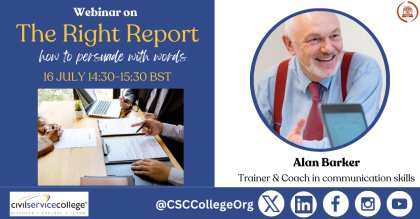Written by Ben Yardley, Learning Coordinator
Report writing is an important part of public servants’ work, at all levels of seniority. However, public servants are sometimes called upon to produce reports without clear guidance on what information they should include or how they should structure their work. Figuring out which information is relevant and how to present it can be a daunting task, especially when giving your work to a more senior colleague.
For Civil Service College’s July webinar, communications coach and CSC associate trainer Alan Barker sets out how to write a successful report that gets your message across clearly and effectively. Alan Barker has over 25 years of experience in teaching professional writing and has worked with organisations including the Greater London Authority, the British Museum and the Environmental Protection Agency in the US. He specialises in creativity and writing skills, helping public servants to sharpen their writing skills and improve their communication.
To watch the full webinar, scroll to YouTube video at bottom of the page
Setting your objectives
There is no single correct way to write a report. The information you present, the structure you employ and the words you choose will vary considerably depending on your particular situation. However, Alan believes that almost everyone faces one especially problematic pitfall when approaching this task: namely, that “the writer is so concerned about writing a report that they forget about the reader”.
One particularly effective tool for overcoming this challenge is a 'function statement', which is laid out in two parts:
I want my report to _____ , so that the reader _____.
By filling these two blanks, you will gain a clearer understanding of what you are trying to accomplish. Depending on your task, you may need to either explain something to your audience or persuade them of something; how you approach the report will be very different depending on which of these two objectives you pick. Similarly, it is important to know what you want your reader to do after reading your report: what is your ‘call to action’? If you can summarise your aims in a single function statement, your writing will be more thoughtful and you will be more mindful of your audience.
Putting pen to paper: the drafting stage
Even if it goes against your instincts, you should spend much less time drafting your report than on planning or editing. Alan says, “you can’t get it right first time, so don’t try” – it is much easier and quicker to edit later than to try to find the perfect phrasing on your first attempt.
Alan also recommends resisting the urge to edit while you write. Drafting the text of your report should ideally be done quickly, in your own voice and without interruption. Remember that if something doesn’t look right, you can always come back to it later!
Finishing touches: editing your report
Alan suggests that, when editing, you tackle paragraphs, sentences, then individual words – in that order. Changing individual words before you have a clear idea of what your paragraph should communicate is a surefire way to take more time than necessary on writing your report.
A paragraph should convey a single idea, which can be expressed in a single (but not too long!) topic sentence. Effective paragraphs provide enough information to support your topic sentence, but no more! If a paragraph is overly long and contains surplus information, it loses its impact and your reader’s attention will begin to wander. By contrast, incorporating topic sentences appropriately can improve your writing in return for very little effort.
Putting your reader first
The most important lesson for anyone who is called upon to produce a report is to be mindful of their reader’s needs and, crucially, their attention span.
Whoever your audience is, it is likely that they will want to spend as little time as possible reading your report. Your responsibility therefore is to make sure all relevant information is presented clearly and concisely, so your reader can extract what they need from the report as quickly as possible. If you start with a clear idea of what you want to accomplish, plan carefully and take time to edit, then you will begin to write reports that put your reader first.

